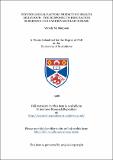Psychological factors predicting health behaviour : the response to risk factor screening for cardiovascular disease
Abstract
The two main aims of this thesis were first, to predict health behaviour and, second, to apply and test the existing psychological theories in this field. The health behaviours concerned were the responses to screening for risk factors for cardiovascular disease. Three empirical studies were carried out. The first response to screening is whether one attends or not. Results showed that uptake of screening in worksite settings (N=425) (Chapter 2) could be predicted by the health beliefs derived from social cognition models. Intention to attend was the best predictor of attendance. However, differences in predictive beliefs between worksites suggested communication factors were also an issue. Subsequently, communication factors were investigated in a study of uptake in general practice (N=210) (Chapter 4) finding that the method of offering screening affected uptake significantly. The second response to screening is the impact it has on the screenee. Results found that communication factors had little effect on screening impact in that there was little difference between three methods of offering screening in terms of their subsequent impact on patients' satisfaction, knowledge, intention or behaviour change (Chapter 4). Social cognitions, however, were found to predict impact in terms of behaviour change with a sample of attenders (N=59) at a screening clinic in general practice (Chapter 3). In the latter study, perceived threat was the best predictor of behaviour change. Four social cognition models were compared against each other in the classification of attenders and non-attenders in the Worksite study (Chapter 2). Apart from Social Learning Theory the other models performed adequately, but the Theory of Reasoned Action was the most successful. More recent theories were examined in the prediction of behaviour change following screening (Chapter 3). The data supported the stage model, the Precaution Adoption Process. The internal structure of the Health Action Process Approach was questioned, but the addition of an 'action phase' in tills model showed promise.
Type
Thesis, PhD Doctor of Philosophy
Collections
Items in the St Andrews Research Repository are protected by copyright, with all rights reserved, unless otherwise indicated.

